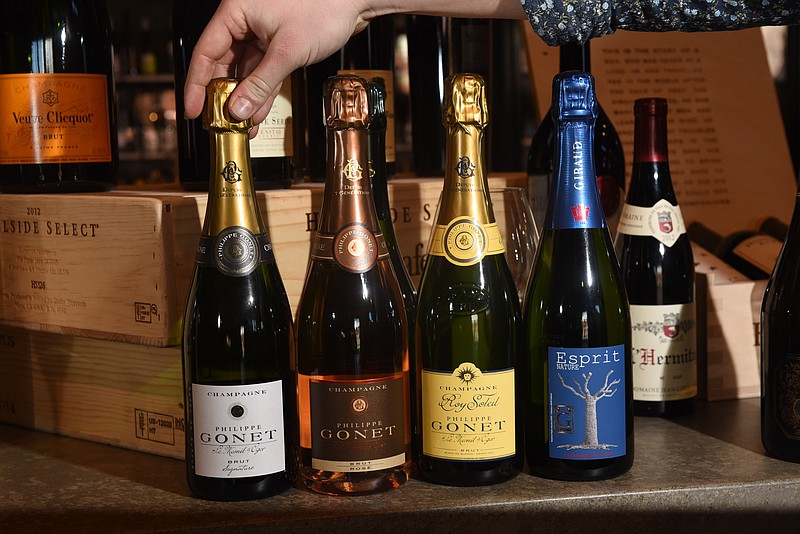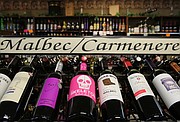Over the past 30 years, JD's Liquor store owner and manager Bill Kadourra has seen wine sales at his Broad Street shop ebb and flow - a 3 percent dip in sales one year might lead to a 5 percent rise in sales the next.
But it wasn't until local residents voted to allow grocery outlets in the area to begin selling wine that Kadourra saw a sharp drop in the numbers. In the less than two years that grocers have been selling wine, JD's Liquor has seen a 63 percent decrease in wine sales, he said.
Now, empty shelves line one whole side of the store where boxes and jugs of wine used to sit. Wines have been consolidated onto other shelves, and 30 racks of wine in the middle of the store have been scaled down to just 16.
"I've shrunk it down tremendously," Kadourra said of the wine selection in the store.
In 2014, the Tennessee Legislature approved selling wine in grocery stores, then 78 counties and municipalities across the state, including Chattanooga, East Ridge and Red Bank, voted to allow grocery stores to begin selling wine as of July 2016.
While local grocers heralded the change as a victory, liquor store owners were apprehensive about what it would mean for their bottom lines. Before the law was implemented, only liquor stores could sell wine.
JD's on Broad Street has arguably been hit harder than many other liquor stores in the area, because there's a Food City less than a mile down the road and JD's wine selection doesn't differ much from what can be found in a grocery store. Kadourra said his store carries 90 percent of the wines a shopper might find on the shelves at Food City's St. Elmo location.
When Imbibe Chattanooga opened its doors in 2015, general manager Brian Leutwiler said, they knew the wine and spirits store was going to have to reel in customers before the law went into effect the next summer.
Leutwiler said the downtown store off Broad Street saw a slight dip in sales in the few weeks after the law was implemented, but things began returning to normal three or four weeks later.
"No one will tell you that it's good news," Leutwiler said about the law. "Just for the sheer convenience factor."
A quick glance at Imbibe's racks reveals wines that a customer might not find at other retailers in the city. Leut-wiler, who has been in the wine business most of his life, said that approach - and not being directly across the street from a grocery store - helps keep Imbibe viable.
When a customer walks into Imbibe, they first see racks of imported wines. To get to the domestic wines, or the ones customers will usually see in a grocery store, they have to walk to the far back corner where they'll find Barefoot, Woodbridge, boxed wines and more. Leutwiler said the setup of the store encourages customers to walk through all the unique wines they carry first before getting to the products they can find in other stores.
"Our whole business plan was to open, get the customers in here and convince them we are a step above everyone else," he said. "Grocery stores can't compete with what we do - they aren't manned to do it."
At Riverside Wine and Spirits on the North Shore, general manager Alison Matera echoed many of Leutwiler's sentiments.
"We saw very little to no change as far as sales and foot traffic," said Matera, adding that the store had one of its best years in 2017.
Similar to Imbibe, Riverside saw a dip in sales in the few weeks after the law was implemented, but things quickly returned to normal, Matera said.
People more concerned with the convenience of buying wine while also buying groceries might opt to go down the street from Riverside to Whole Foods or Publix, but Matera said there are two reasons why people would choose to come to Riverside instead: prices seem to be a bit cheaper on average and there are employees who are knowledgeable about wine. The free wine tastings every Saturday also help, she said.
"If I go into the grocery store and ask for a Sancerre wine then they are going to look at me sideways," Matera said.
"Anyone here would know what that is," Matera added about the French sauvignon blanc.
Bacchus Wine and Spirits sits right across from the Walmart Supercenter on Highway 153 in Hixson and has felt some of the same pains as JD's, said owner Lori Sharp. But Sharp considers Bacchus "one of the luckier ones."
She said some of the wines at Bacchus tend to be a few dollars cheaper than what customers can find at a grocery store, and she also tries to bring in wines that customers won't be able to track down at Walmart.
"I did lose business, but I'm gaining it back," she said. "I have a really good customer base. The customers we have realize we are family owned and they have supported us."
The hard times may not be over yet, though. Tennessee retailers have set another ambitious legislative goal for the new year: seven-day wine sales.
Right now, no liquor or grocery stores in Tennessee can sell wine on Sundays, but many groceries are looking to change that. Kadourra and Sharp said they don't see the advantage in that for liquor stores, which are now closed on Sundays.
Sharp said she believes customers are used to shopping Monday through Saturday, so she doesn't see where the extra money will come from.
"It would just spread the sales out," she said. "I don't think it will increase anything but the headache."
Contact Allison Shirk at allisonshirk92@gmail.com.

